
On 9 March 2017, new Home Office guidance on refugee leave to remain was issued. Previously, people recognised as refugees in the UK were granted five years’ refugee status or humanitarian protection. After this, they were able to apply for permanent settlement (“indefinite leave to remain”) in the UK.
The granting of permanent settlement was pretty much automatic for most refugees.
Under the new policy, all those who apply for settlement will be subject to a “safe return review” to see if the Home Office deem it now safe for the refugee to return to that country.
This new policy is very concerning, and is part of a larger trend to restrict rights for refugees and other migrants.
Today, more than seventy organisations have come together in this open letter to explain why the policy should be reversed.
Makhosi Sigabade, a refugee living in the UK, worries what the change would mean for him:
“After being given a false sense of hope and stability I am being made to relive the nightmares of my past. I am now confronted with a possibility of going back to face the same persecution from which I fled. The system meant to protect people seeking sanctuary threatens to expose them to the dangers they flee.”
Please share this open letter far and wide! If you’re on social media, the hashtag to use is #RebuildingLives.
GB press release is available here. BBC coverage of the letter (Safe return review refugee policy ‘beyond basic morality’) here. Coverage in The Independent is here, and coverage in the Irish Times here.
Dear Home Secretary,
We, the undersigned representing broad range of civil society interests, express our dismay and extreme concern at the latest change to refugee policy in the UK.
The announcement that those who have already been granted full rights as refugees will later have that decision reviewed violates the state’s obligation to provide sanctuary and refuge to those it has granted the right to remain. This move is part of a worrying trend to weaken the concept of a refugee and to make the UK a ‘hostile environment’ for migrants.
We call on the Home Office to reverse this decision. When a refugee’s claim has been recognised, they should be given permanent residency.
Applying for Asylum
The process of applying for and gaining refugee status in the UK is long and difficult. Many don’t make it. It involves the impossible decision to leave one’s friends, family and home, embark upon a dangerous journey, and facing months, sometimes years, of uncertainty awaiting a decision. They face intrusive, re-traumatising interviews, degrading reporting mechanisms, confusing correspondence, managing life on a shoestring budget of £37 a week, and regular appeals in the courts. Asylum seekers are often detained or made destitute during the application process. Those who survive the above are eventually awarded refugee status. This status allows people to work, study and live in the UK for five years.
At the end of five years, the normal process has been to make a perfunctory application for ‘indefinite leave to remain’, following which people could apply to be British citizens.
The awarding of refugee status should bring with it the promise of stability and security. It is a chance to build a new home, to study or work, to become a part of the community.
New Changes
The Home Office’s decision to review every application at the end of the five years to see if their home country is ‘safe’ undermines this promise, bringing with it the threat of deportation. These changes put an end to that hope of stability, and introduce an additional layer of bureaucracy, uncertainty, and evaluation at the hands of a dispassionate state. All of the difficult administrative hurdles to get status in the first place will be repeated. There is no question that this will have a devastating impact on the mental health of those who have sought to make a new life in the UK.
There are many reasons why this policy should be immediately reversed: the moral, societal and financial costs are significant.
Impact of these changes
This new policy extends a traumatic period and creates an environment of uncertainty, instability, and threat which will seemingly have no end point. Financial stability is undermined, given the barriers to finding long term employment with limited leave to remain. Planning for long-term study becomes complex, and there is little incentive to pay the substantial fees required to get licensed or have qualifications recognised in the UK with a permanent threat of being forced to leave looming over every life decision made. Individuals may put off having families, or feel the strain of having children who may be forced to leave the only home they have ever known.
The removal of the pathway to citizenship for refugees could have detrimental outcomes for integration and social cohesion. What incentive do new members of our community have to become part of the place they live, to invest in it, to call it home, if they may have to leave again? How can we expect people to learn cultures and customs, and to share their cultures and customs with us, if there is a ticking clock on their time with us? And what of the impact on schools, neighbourhoods, and friendships when someone who has been there for so long is suddenly gone?
Underlying all of these factors are significant financial costs. More than 60,000 refugees have been awarded leave in the last five years. The cost of administering an additional layer of applications, the levels of bureaucracy involved in determining the safety of the applicants’ home country, the costs of detaining and deporting individuals who otherwise could be working, supporting themselves and contributing both financially and socially to the UK. This has all of the hallmarks of a massive financial and administrative undertaking.
And for what?
Perhaps the strongest argument against this policy, beyond basic morality, is that it is not clear what the arguments for it could be. This is a disruptive, expensive, inhumane policy, and we have yet to hear the benefits we are expected to believe outweigh these significant costs.
We call on the Home Office to reverse this decision and indeed go further and grant refugees permanent residency when their claim is recognised.
Signed:
Participation & Practice of Rights (PPR)
Northern Ireland Community of Refugees and Asylum Seekers (NICRAS)
Homeplus NI
Horn of Africa People’s Aid NI (HAPANI)
Lower Ormeau Residents Action Group (LORAG)
African and Caribbean Support Organisation Northern Ireland (ACSONI)
NIACRO
Belfast City of Sanctuary
West Against Racism Network (WARN)
Belfast City Mission
South Belfast Foodbank
Full Service Community Network
Students Together with Asylum Seekers & Refugees (STAR) QUB
Queen’s University Belfast Student Union
NI Somali Association (NISA)
Sudanese Community Association Northern Ireland (SCANI)
Cultivate Respect, Appreciate Inclusion in Communities in Northern Ireland (CRAIC NI)
Refugees Welcome NI
Colin Harvey, Professor of Human Rights Law in the School of Law, Queen’s University Belfast
Zimbabwean Association NI
Belfast Feminist Network
Housing4All
Right to Remain
Migrant Voice
Jesuit Refugee Service UK (JRS UK)
Solidarity With Refugees
Calais Action
Migrants Rights Network
Asylum Aid/Migrants Resource Centre
Manchester Migrant Solidarity
African Rainbow Family
Migrant Artists Mutual Aid
City of Sanctuary
Leeds Asylum Seekers’ Support Network
Destitute Asylum Seekers Huddersfield
Coventry Asylum and Refugee Action Group
Bristol Hospitality Network
Communities and Sanctuary Seekers Together (CAST)
South Yorkshire Migration and Asylum Action Group (SYMAAG)
Bolton Destitution Project
St. Augustine’s Centre (Calderdale)
Hope Projects (West Midlands)
Displaced People in Action
Swansea City of Sanctuary
Host Nottingham
Leeds No Borders
Nottingham Arimathea Trust
Unity Centre Glasgow
Space4U Cardiff
Black Lives Matter UK
Against Borders for Children
Scottish Refugee Council
NACCOM
Lesbian Immigration Support Group
ASIRT
Slough Refugee Support
Detention Action
Zimbabwe Human Rights Organisation
Home 4U (Cardiff)
Govan Community Project
Medact
Restoration of Human Rights Zimbabwe
Whiterock Children’s Centre (Belfast)
Boaz Trust
Northwest Migrants Forum
The Jewish Council for Racial Equality (JCORE)
Falls Women’s Centre
UK Lesbian & Gay Immigration Group
Migrant and Refugee Children’s Legal Unit
SOGICA, University of Sussex
North Belfast Friendship Club
Coventry Refugee and Migrant Centre
Praxis Community Projects
Scottish Faiths Action for Refugees
City of Sanctuary Bolton
City of Sanctuary Doncaster
Scottish Detainee Visitors
Doncaster Conversation Club
Northern Ireland Council for Racial Equality (NICRE)
Room to Heal
UNISON NI Black and Migrant Workers group

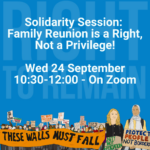
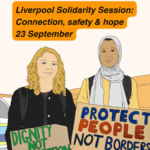
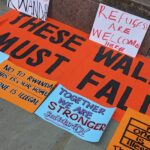







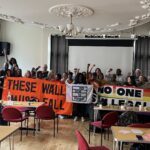

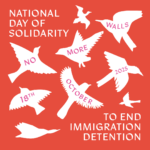
Unsettling Refugees – I support the 70+ organisations asking for this to be reversed and for refugees to be allowed to rebuild their lives permenantlyvin the U.K.
Please add Doncaster Conversation Club to the list. The Conversation Club is a weekly drop in for asylum seekers/refugees offering help, advice and friendship